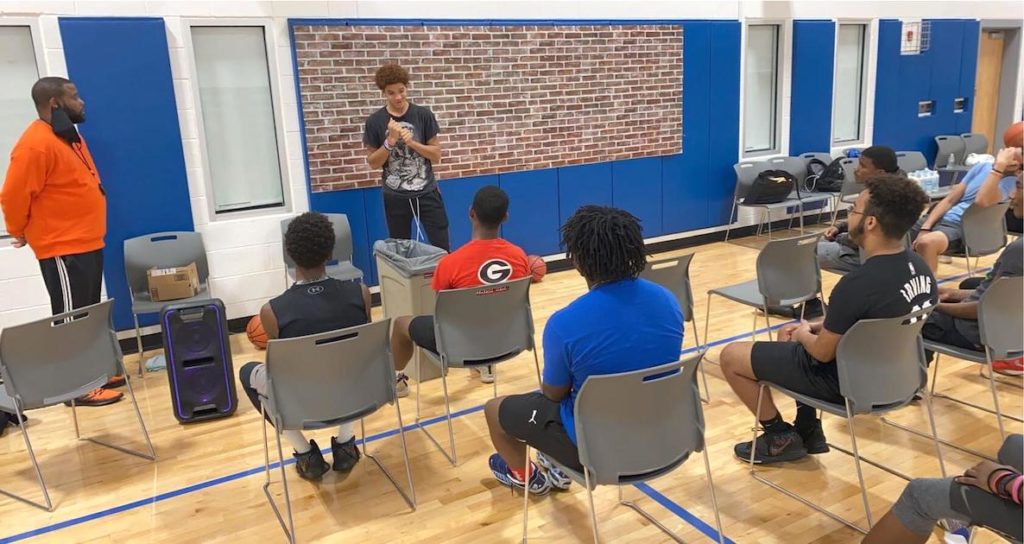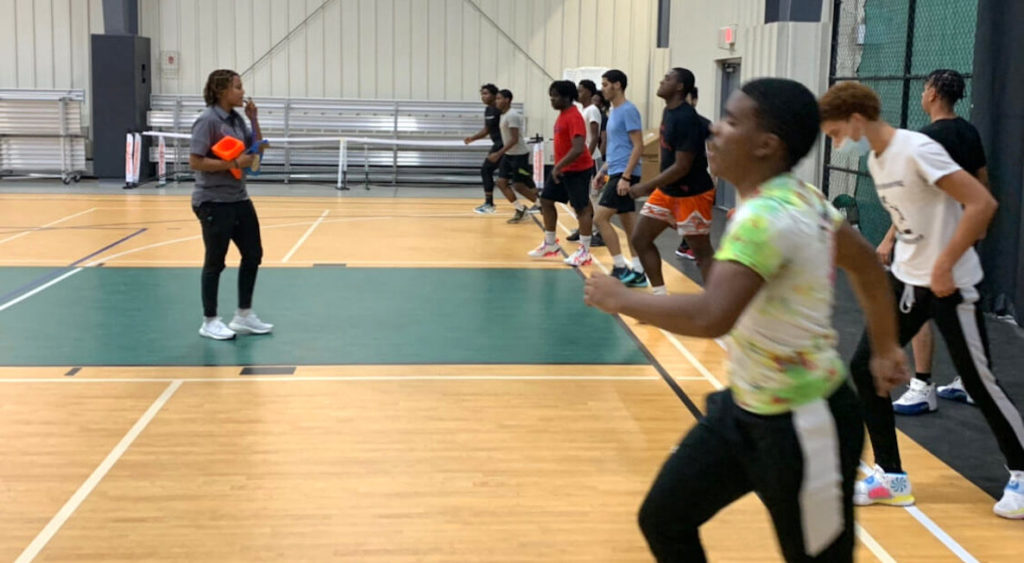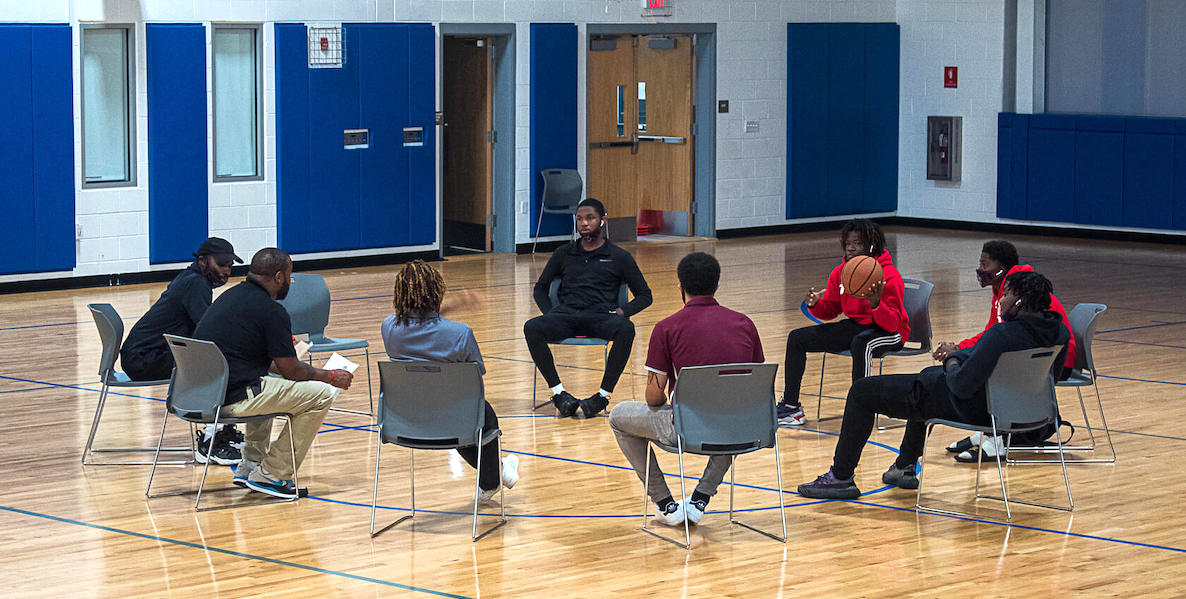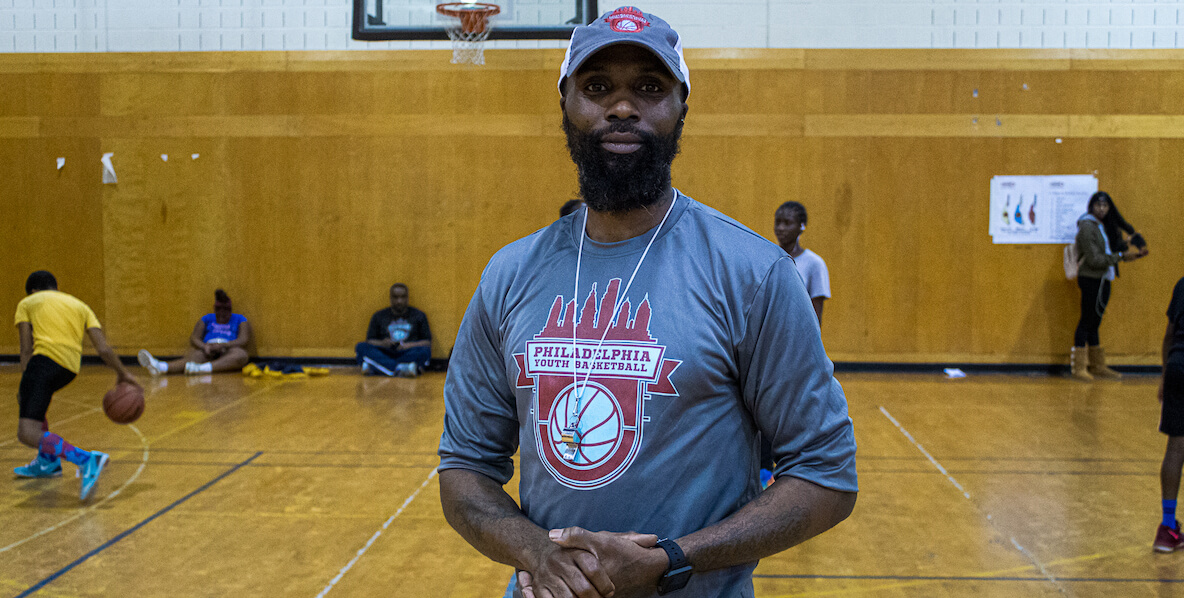![]() Today, The Citizen will kick off day one of our (virtual) 3rd annual Ideas We Should Steal Festival. If you’d attended last year’s in-person Festival, held at the stunning Ralph J. Roberts Forum at the Comcast Center, you’d have had the powerful experience of hearing from Taylor Paul, who closed out the event with a rousing talk and call to action.
Today, The Citizen will kick off day one of our (virtual) 3rd annual Ideas We Should Steal Festival. If you’d attended last year’s in-person Festival, held at the stunning Ralph J. Roberts Forum at the Comcast Center, you’d have had the powerful experience of hearing from Taylor Paul, who closed out the event with a rousing talk and call to action.
Paul, a returning citizen who spent 23 years in jail for his role in a 1994 murder, candidly shared his journey with the crowd. He talked about the deep transformation he underwent while serving time, a process that prompted him to change his name from Paul Taylor to Taylor Paul: a public declaration of the fact that he was returning to society not only as a new man, but as the exact opposite of the man he’d been on the streets.
As part of that commitment, Paul and his lifelong friend and fellow returning citizen, Weldon “Prince” Bunn, now run RVA League For Safer Streets in Richmond, Virginia. It’s a basketball league, with a twist: Anyone who wants to compete must first participate in workshops on topics like critical thinking and conflict resolution skills.
The program’s motto: “No workshop, no jumpshot.” There in the bleachers, rival gang members sit alongside each other and the police, who have their own team, and the fire department, who have another team. It has accomplished something much needed here in Philly: Richmond’s police chief credits the program with lowering the gun violence rate there by 8 percent.
Scaling a great idea
It was with this in mind that in June, the Citizen gave its 2nd annual Jeremy Nowak Urban Innovation Award to a partnership between Paul’s RVA and Philadelphia Youth Basketball (PYB), a nonprofit that strives to uplift and empower underserved Philly kids through hoops.

With the generous support of Spring Point Partners, the $50,000 grant allowed PYB to launch a pilot with 15 young men this fall, based on RVA’s approach. The teen boys, aged 15 to 17, all have had some kind of run-in with the law—but none are bad or broken kids, says Kenny Holdsman, president and CEO of PYB.
Unlike the RVA program, which focuses on older men involved in gun violence and gang activity, PYB’s program strives to set young men on the right path before their behaviors escalate to larger offenses.
“The kids in our program, if you were to have a one-on-one conversation with them or read one of their journal entries, you’d see there’s a sensitivity about these kids, a sweetness about them, a thoughtfulness about them,” Holdsman says. “They just need to be given the opportunity for all of that goodness to surface. These kids are not inherently flawed or broken or evil. They are complex human beings in a way that we all are. And they need opportunities to be loved and mentored and guided.”
“These kids are not inherently flawed or broken or evil. They are complex human beings in a way that we all are. And they need opportunities to be loved and mentored and guided,” says Holdsman.
Holdsman’s team includes Tori Harrison, a West Philly native who played high school and college basketball and was a police officer and a high school basketball coach. There’s Aaron Crump, a returning citizen and the son of the late Philly hoops legend Hank Gathers who, Holdsman says affectionately, “is an amazing guy with a really big heart.” And then there’s Jaryan Garner, who grew up in Camden, went to Germantown Academy, and played basketball at the University of Virginia and St. Joe’s. Garner works during the day in a residential facility for at-risk kids, and at night for PYB.
The team reached out to PHA to secure the Lucian Blackwell Recreation Center at 46th and Aspen to be the site of their program; to recruit teens, they worked with the DA’s office of diversion and the Philadelphia Anti-Drug/Anti-Violence Network (which, coincidentally, is led by a former prosecutor and high school and college basketball player, George Mosee).
Holdsman’s team holds sessions with its kids three evenings a week, for three hours each: 90 minutes on the court, 90 minutes in workshop, addressing issues like identity formation, goal setting, transcending one’s own circumstances, resolving conflict. There’s a lot of journaling, a lot of group conversation, and a lot of one-on-one contact between the young people and the coach-mentors.
Banding Together
![]() As a group, PYB staff and teens have worked on processing the tumult of 2020: a pandemic that has disproportionately ravaged Black communities, violence that has disproportionately ravaged Black men.
As a group, PYB staff and teens have worked on processing the tumult of 2020: a pandemic that has disproportionately ravaged Black communities, violence that has disproportionately ravaged Black men.
The group gelled quickly, things were coming together.
Then, on the night of Thursday, October 22, PYB’s kids and staff found themselves in the middle of a crossfire between competing gangs, right outside of the rec center. Staff ushered the teens inside, and hunkered down until police arrived.
No one was hurt—physically.
But one teen was just getting dropped off by his grandfather when the shooting broke out. His instincts kicked in, and he ducked.
When he looked up, a bullet was lodged in his headrest.
“This was really upsetting, on a lot of levels,” Holdsman says. The team took the boys for pizza, drove everybody home. They spent the next few days with the boys, listening to them, consoling them, being there for them.
The staff had to decide: Should they stay at the Blackwell Rec Center? Should they move?
They opted for the latter, moving programming to the 23rd Street Armory—before the National Guard came to town, and displaced them yet again.
Shifting Gears
Garner, with her Camden roots, found a new space for the players in South Jersey. Holdsman worried that the boys wouldn’t want to sit in a van for up to an hour each way, but they loved it—the chance to get out of the city, the opportunity to play in a gorgeous new facility, to have more time with their new peers, talking and joking and being kids during the van rides.

Recently,, the mayor issued the latest coronavirus mandate; so PYB will once again pivot, pausing in-person meetups but making sure that every kid connects with a coach by phone or Zoom or FaceTime several times a week.
It hasn’t been easy. But there is enough enthusiasm for the program that Holdsman and his team plan to make it a permanent part of PYB’s suite of programs. They have some continuance funding, and will seek more.
![]() Randy Butler, a program manager at PYB who played basketball at Colgate and did a Sport for Social Change program in Ireland, is leading PYB’s measurement and evaluation work, and PYB is part of a national cohort of groups who are doing deep dives into the data, to see if these types of programs are effective in curbing violence.
Randy Butler, a program manager at PYB who played basketball at Colgate and did a Sport for Social Change program in Ireland, is leading PYB’s measurement and evaluation work, and PYB is part of a national cohort of groups who are doing deep dives into the data, to see if these types of programs are effective in curbing violence.
It will take time to measure the effect of the program, for sure—but at a time when our city has seen more than 300 murders before year’s end, all efforts to address and curb violence need to be part of the conversation.
“We want to set up this program to be an exemplary model for how it is that Black boys who are older and have gotten in trouble with the law and played in street life can build more positive relationships with learning and school and peers and adults and the community and what they see as their future trajectories,” Holdsman says.
Paul and Bunn, who recently came to Philly to see the program in action, were immediately impressed by the staff of PYB, the teen boys who are part of the program, the workshops and basketball workout. They call Crump and Garner the program’s “glue,” and liken their roles to those of Paul and Bunn down in VA. While up here, Paul even got his lifelong friend, Allen Iverson, to FaceTime with the kids.
“If there’s a shooting, we don’t run away from it, we run to it,” Paul says. “You can’t be afraid of the mess. And we’re not afraid of it. So whether it’s Philadelphia, whether it’s Jersey, whether it’s Compton, California, we’re gonna answer the bell whenever it’s rung,” Paul says.
Bunn hopes that, in time, PYB can safely return to the Blackwell Center, to the community, and that, as they do at RVA, PYB can also work to have the police involved and integrated into the program. (Paul is fond of joking about how bad the police team’s record is in RVA. “I think they won three games since 2017!”)
Bunn also wants to see PYB not only be able to employ people from the community, but engage with respected informal leaders in the neighborhood, who can serve liaison roles, be eyes and ears and champions.
“A lot of kids are being funneled through the judiciary system, [but] we [also] like those kids that just come from around the way. The kids that tell other kids, Hey, man do you know about PYB? You all should come,” Paul says. “That’s what we’re trying to make contagious.”
Holdsman understands this, the need to penetrate and support the community.
![]() “The pull of street life is real. And if you are growing up in a community where the schools and the neighborhoods are really underinvested in, and you’re continually being told that you’re lesser-than, and the streets are where you can find voice, value, and visibility, you can be seen and heard and have money in your pocket and feel powerful, then that pull is really strong,” he says. “So as a city, we need to be really purposeful about creating viable alternatives, structured alternatives for young people to feel as though they are being valued and invested in. And that’s one of the things that we’re doing.”
“The pull of street life is real. And if you are growing up in a community where the schools and the neighborhoods are really underinvested in, and you’re continually being told that you’re lesser-than, and the streets are where you can find voice, value, and visibility, you can be seen and heard and have money in your pocket and feel powerful, then that pull is really strong,” he says. “So as a city, we need to be really purposeful about creating viable alternatives, structured alternatives for young people to feel as though they are being valued and invested in. And that’s one of the things that we’re doing.”
It’s easy, he says, to put white, educated, middle-class lenses on a problem and say, the risk-reward of getting involved in street life is really stupid. “Well, from my or your vantage point, the risk-reward is not strong. But the way it’s viewed by some kids, it’s voting with their feet; it isn’t that unreasonable if one lived in the circumstances and viewed the world in the way that they do.”
Holdsman’s staff takes texts and calls from the boys at all hours; their work is not linear or confined to set hours. Which is how Paul and Bunn have always operated, too.
“If there’s a shooting, we don’t run away from it, we run to it,” Paul says. “You can’t be afraid of the mess. And we’re not afraid of it. So whether it’s Philadelphia, whether it’s Jersey, whether it’s Compton, California, we’re gonna answer the bell whenever it’s rung.”




